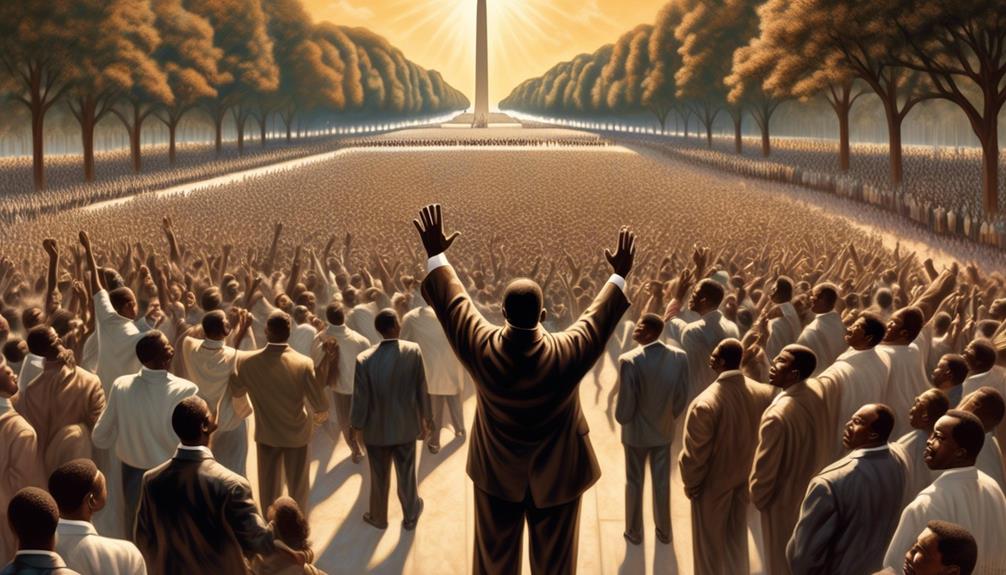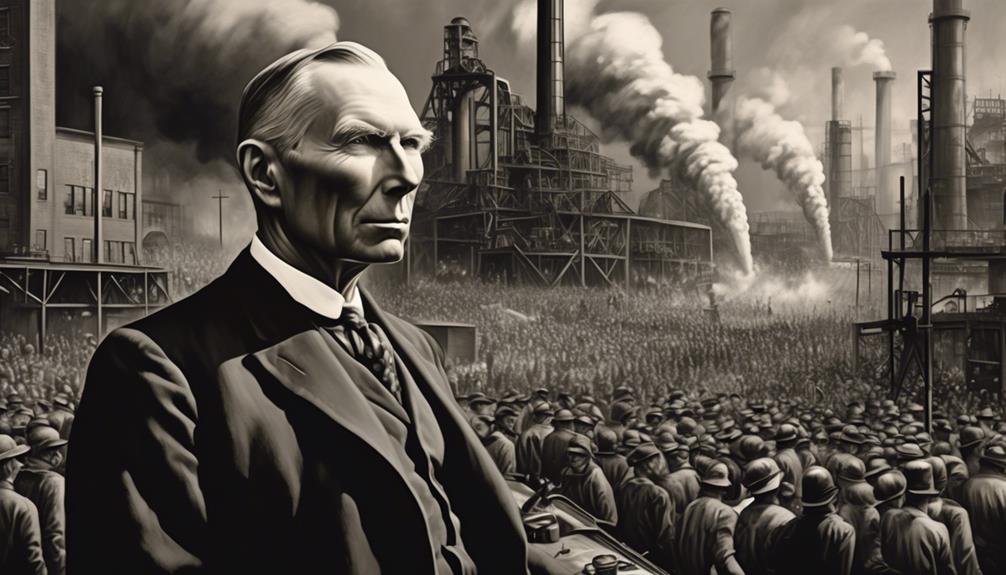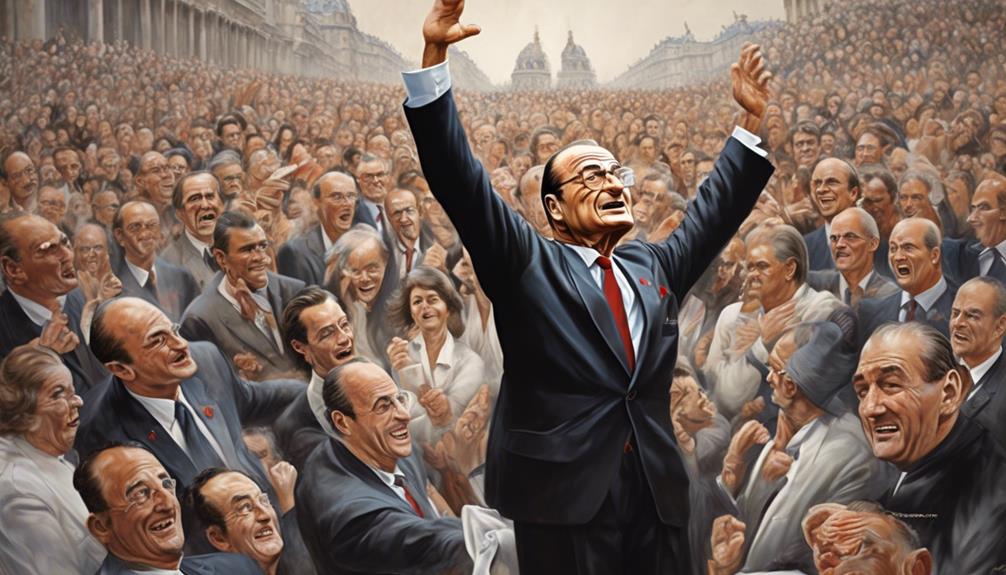Within the sphere of civil rights, Martin Luther King, Jr. emerges as a monumental figure, serving as a source of hope and motivation. His speeches, akin to beams of light piercing through the most somber skies, possess the ability to elevate and bring together.
As we delve into the profound wisdom of this famous African American leader, we encounter a collection of quotes that resonate with timeless relevance. These quotes encapsulate the essence of his tireless pursuit for justice, equality, and peace.
Through his eloquence and unwavering commitment to the cause, Dr. King left an indelible mark on history, reminding us that the struggle for civil rights is a collective responsibility.
Let us explore the transformative power of his words and draw inspiration from his unwavering determination to create a better world for all.
Key Takeaways
- Martin Luther King, Jr. believed in the power of unity to strengthen communities and amplify voices and demands for justice.
- He emphasized the interconnectedness of social justice issues, highlighting the importance of addressing inequality wherever it exists.
- King advocated for actively promoting qualities of light such as knowledge, love, and equality, and shedding light on injustices.
- He stressed the importance of speaking up and taking action to bring positive change, as remaining silent allows injustices to persist.
I Have a Dream
The iconic speech 'I Have a Dream', delivered by Martin Luther King, Jr., during the 1963 March on Washington for Jobs and Freedom, continues to resonate as a powerful call for racial equality and justice in America. This speech holds immense significance, not only in the context of the Civil Rights Movement but also as a timeless message that still holds relevance today.
One of the key themes emphasized in 'I Have a Dream' is the importance of unity. Dr. King spoke passionately about the need for people of all races to come together and work towards a common goal of equality. He believed that by standing united, we could overcome the obstacles of racism and discrimination that plagued our society. His words inspired millions to join the fight for justice and served as a reminder that progress is achieved through collective action.
Injustice Anywhere Is a Threat to Justice Everywhere

In the powerful words of Martin Luther King, Jr., he reminds us that injustice anywhere poses a significant threat to justice everywhere. This statement emphasizes the interconnectedness of social justice issues and the importance of addressing inequality wherever it exists. To understand this concept better, let's explore the power of unity and the fight for equality in a table format:
| Power of Unity | Fighting for Equality |
|---|---|
| Strengthens communities and movements | Challenges systemic discrimination |
| Amplifies voices and demands for justice | Promotes equal opportunities for all |
| Builds bridges between different groups | Advocates for fair treatment and rights |
| Inspires collective action and solidarity | Strives for a just and inclusive society |
Darkness Cannot Drive Out Darkness; Only Light Can Do That
To combat darkness, only the illumination of light can truly be effective. This profound statement by Martin Luther King, Jr. sheds light on the power of light itself. Darkness symbolizes ignorance, hatred, and injustice, while light represents knowledge, love, and equality. King believed that in order to overcome the darkness in the world, we must actively promote and foster the qualities of light.
In the context of civil rights, King understood that the fight against racial discrimination required more than just the absence of injustice; it required the presence of justice. In other words, simply eliminating discriminatory practices wasn't enough. True equality and justice could only be achieved by actively promoting fairness and inclusivity. This required shedding light on the injustices faced by African Americans and advocating for their rights.
Furthermore, King recognized the impact of silence in perpetuating darkness. He believed that remaining silent in the face of injustice only served to perpetuate it. It's through speaking up and taking action that we can bring about positive change. By shining a light on the issues that plague our society, we can expose the darkness and work towards a brighter future.
Our Lives Begin to End the Day We Become Silent About Things That Matter
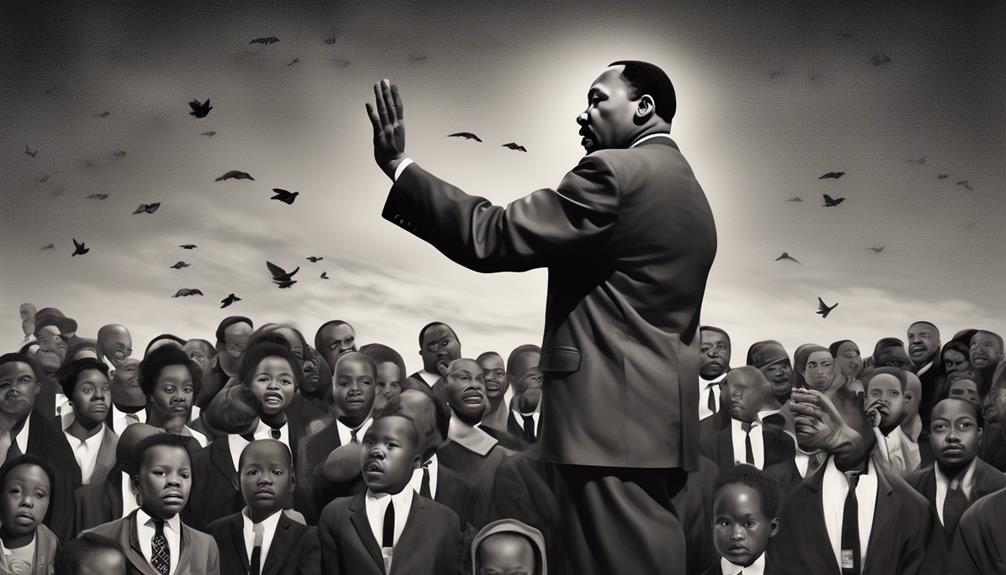
When we choose to remain silent about the things that matter, we inadvertently contribute to the decline of our own lives.
Martin Luther King, Jr.'s statement reminds us of the importance of speaking up and taking action.
By staying silent, we allow injustices to persist and deny ourselves the opportunity to create positive change.
It's through our voices and actions that we can make a difference and ensure a better future for all.
The Importance of Speaking Up
Silently standing by and not speaking up about matters that truly count is the beginning of the end for our lives. Martin Luther King, Jr. understood the dire consequences of silence and emphasized the importance of speaking up for what's right.
When we remain silent, we allow injustice to prevail and perpetuate the cycle of oppression. Speaking up isn't easy; it requires courage, determination, and a willingness to embrace disappointment. However, the rewards outweigh the risks.
By speaking up, we can bring attention to important issues, inspire change, and empower others to do the same. Our voices have the power to shape the world around us and create a better future for all.
Let's not remain silent, but instead, let's find our voice and use it to make a difference.
Consequences of Silence
Martin Luther King, Jr. understood the profound impact of remaining silent about matters that truly count. He believed that our lives begin to end the day we choose not to speak up about things that matter. The importance of raising your voice can't be overstated.
When we stay silent, we allow injustices to prevail and perpetuate. Our silence condones the status quo and stifles progress. It's through the act of speaking up that change can occur.
Staying silent has significant consequences, not only for ourselves but also for the communities we're part of. It leads to a loss of personal integrity, a failure to stand up for what's right, and a missed opportunity to make a difference.
As Dr. King eloquently put it, 'Our lives begin to end the day we become silent about things that matter.'
The Time Is Always Right to Do What Is Right

Is there ever a wrong time to do what's right? According to Martin Luther King, Jr., the answer is a resounding no. King believed in the power of right action and the importance of moral responsibility. He understood that doing what's right isn't always easy or convenient, but it's necessary for progress and justice.
Here are four reasons why the time is always right to do what's right:
- Integrity: Acting in accordance with our values and principles is essential for maintaining our integrity. When we do what's right, even in the face of adversity, we show our commitment to our beliefs and earn the respect of others.
- Social Change: Right action has the power to bring about social change. By standing up against injustice and advocating for equality, we can create a better world for future generations.
- Empathy: Doing what's right often involves putting ourselves in the shoes of others and understanding their experiences. This fosters empathy and promotes a more compassionate society.
- Personal Growth: Acting with integrity and moral responsibility helps us grow as individuals. It challenges us to confront our biases and prejudices, and encourages us to constantly strive for self-improvement.
I Believe That Unarmed Truth and Unconditional Love Will Have the Final Word
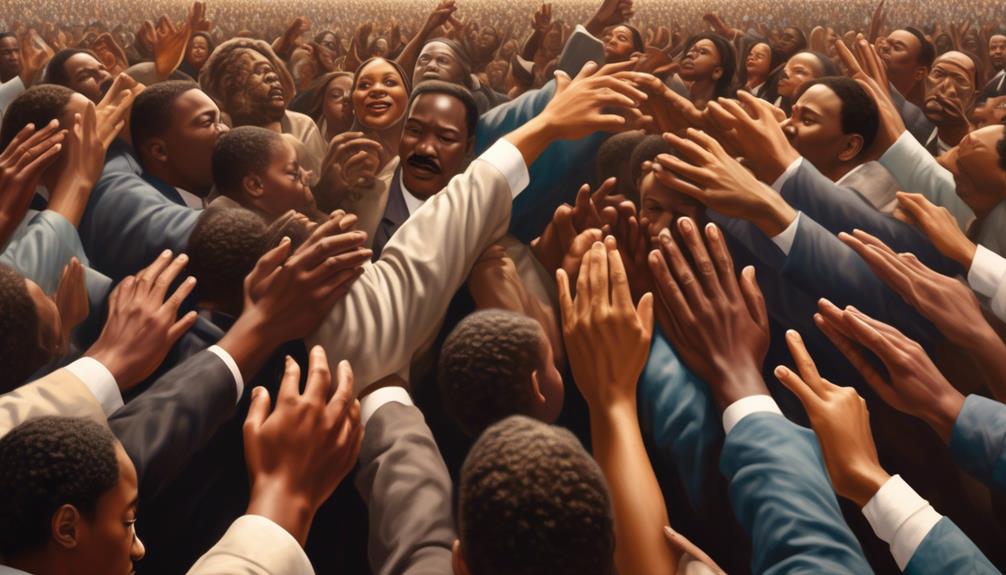
Unarmed truth and unconditional love, as believed by Martin Luther King, Jr., are seen as the ultimate forces that will ultimately prevail. King's unwavering commitment to these principles forms the cornerstone of his philosophy and activism. He understood the importance of love and truth in the pursuit of justice and equality, recognizing that they have the power to transform individuals and societies.
For King, love wasn't a mere sentiment, but a potent force that could break down barriers and heal divisions. He believed that unconditional love could bridge the gaps between races, religions, and ideologies. Love, in King's vision, could inspire compassion and empathy, fostering understanding and unity among all people.
Similarly, King emphasized the significance of unarmed truth. He believed that the truth, when spoken fearlessly and honestly, had the power to dismantle systems of oppression and discrimination. He saw the importance of uncovering the truth and exposing injustice, even when it was uncomfortable or unpopular.
Moreover, King recognized the need to overcome silence and speak up against injustice. He understood that silence perpetuates injustice and that speaking out is a necessary step towards change. By challenging the status quo and amplifying the voices of the marginalized, King sought to create a society where truth and love prevail.
Faith Is Taking the First Step Even When You Don't See the Whole Staircase

When it comes to faith, Martin Luther King, Jr. reminds us that it's about taking the first step even when we can't see the whole staircase. This quote speaks to the belief in uncertain outcomes, the courage it takes to face uncertainty, and the ability to take leaps of faith.
It teaches us that faith isn't about having all the answers or knowing exactly how things will turn out, but rather about trusting in something greater than ourselves and having the courage to move forward even amidst uncertainty.
Belief in Uncertain Outcomes
Taking the first step in the face of uncertain outcomes requires an unwavering belief in the power of faith, as expressed by Martin Luther King, Jr.'s iconic quote, 'Faith is taking the first step even when you don't see the whole staircase.'
Believing in uncertain outcomes can be challenging, but it's in these moments of ambiguity that true strength is found. To evoke an emotional response in the audience, consider the following:
- Embrace the unknown: Uncertainty can be uncomfortable, but it's also an opportunity for growth and discovery.
- Trust in yourself: Have confidence in your abilities and know that you have the resilience to overcome any challenges that may arise.
- Find inspiration in the journey: Focus on the process rather than solely on the end result. Each step taken brings you closer to your goals.
- Emphasize the power of hope: Even when facing uncertainty, maintaining hope can provide the motivation and determination needed to persevere.
Believing in uncertain outcomes requires courage and a deep belief in oneself. It's through taking that first step, even when the path is unclear, that we can find strength and ultimately achieve greatness.
Courage in Facing Uncertainty
In the face of uncertain outcomes, one must summon the courage to step forward, even when the path ahead remains obscured, as Martin Luther King, Jr. eloquently proclaimed, 'Faith is taking the first step even when you don't see the whole staircase.'
This quote reflects the importance of taking risks and overcoming fear in the face of uncertainty. Courage isn't the absence of fear, but rather the ability to move forward despite it. When we're faced with uncertain situations, it's natural to feel hesitant and unsure.
However, it's in these moments that we must push ourselves to take that first step, to have faith in our abilities and trust that the path will become clearer as we progress. By embracing uncertainty and having the courage to move forward, we open ourselves up to new opportunities and possibilities for growth and success.
Taking Leaps of Faith
Embarking on a journey of uncertainty requires immense faith and the willingness to take that initial leap, even when the path ahead is shrouded in darkness. It's in these moments of taking risks and overcoming fear that we truly grow and discover our potential.
Here are four reasons why taking leaps of faith is essential in our personal and professional lives:
- Personal growth: Stepping outside our comfort zone allows us to confront our fears and limitations, leading to personal growth and self-discovery.
- Building resilience: Taking leaps of faith helps us develop resilience, enabling us to bounce back from failures and setbacks with strength and determination.
- Seizing opportunities: By taking risks, we open ourselves up to new opportunities that can lead to success and fulfillment.
- Breaking barriers: Taking leaps of faith challenges societal norms and expectations, breaking barriers and paving the way for progress and change.
The Ultimate Measure of a Man Is Not Where He Stands in Moments of Comfort and Convenience, but Where He Stands at Times of Challenge and Controversy
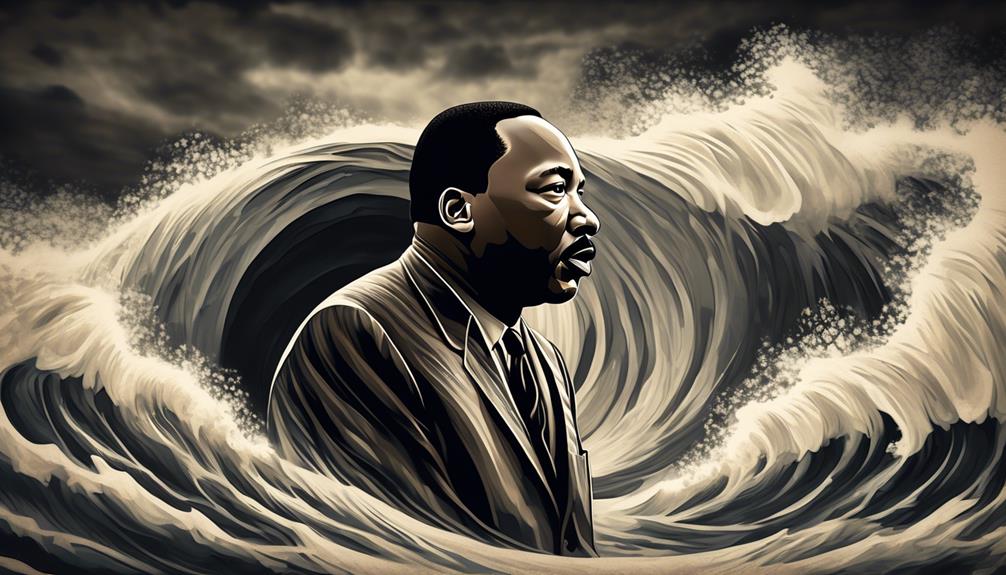
The ultimate measure of a person's character isn't determined by their actions in moments of comfort and convenience, but rather by where they stand when faced with challenges and controversy. This quote by Martin Luther King, Jr. emphasizes the importance of perseverance and the power of standing up for what's right, even when it's difficult.
When we're comfortable and everything is going well, it's easy to act in ways that align with our values and beliefs. However, it's during times of challenge and controversy that our true character is revealed. It's in these moments that we're tested and forced to make difficult decisions. Will we stand up for justice and equality, or will we remain silent and complacent?
Martin Luther King, Jr. understood the significance of standing up for what's right, even in the face of adversity. He faced immense challenges and controversy during the civil rights movement, yet he remained steadfast in his fight for equality. He showed us that true strength and character lie in the ability to persevere and stand up for what we believe in, regardless of the obstacles we may face.
The Arc of the Moral Universe Is Long, but It Bends Toward Justice

The concept of the arc of the moral universe bending towards justice is a powerful and hopeful idea put forth by Martin Luther King, Jr.
It suggests that although the path to justice may be long and filled with challenges, ultimately, justice will prevail.
This quote highlights King's unwavering belief in the power of righteousness and the inevitability of justice, serving as a source of inspiration for those striving for a more just and equitable world.
Justice's Long Journey
Throughout history, the journey towards justice has been marked by its arduous and winding path, yet it steadfastly progresses towards its ultimate destination. This journey isn't without its challenges and setbacks, but it's through these moments that true progress is made.
Here are four important aspects that shape justice's long journey:
- Consequences of silence: Remaining silent in the face of injustice only perpetuates the status quo. It's vital to speak out against injustice and advocate for change.
- Embracing disappointment: Disappointment is an inevitable part of the journey towards justice. However, it's important to embrace disappointment and use it as motivation to continue fighting for what's right.
- Persistence: Justice isn't achieved overnight. It requires consistent effort and unwavering determination to overcome obstacles and bring about meaningful change.
- Collective action: Justice is a collective endeavor. It's only through the unity and collaboration of individuals and communities that we can truly make a difference.
As we navigate the long journey towards justice, it's crucial to remember these aspects and stay committed to the cause.
Hope in Moral Universe
After understanding the importance of persistence and collective action in the journey towards justice, we now turn our attention to the concept of hope in the moral universe.
Hope is a powerful force that can propel individuals and communities towards positive change. It's the belief that even in the face of adversity, justice will ultimately prevail. Martin Luther King, Jr. famously said, 'The arc of the moral universe is long, but it bends toward justice.' This quote encapsulates the idea that although progress may be slow and difficult, justice will eventually triumph.
However, hope can't exist in a vacuum. The consequences of silence and apathy must be recognized and addressed. It's through acknowledging and embracing disappointment that we can mobilize and work towards creating a more just and equitable society.
Embracing the Arc
Embracing the journey towards justice, we recognize the enduring nature of the moral universe and its inevitable bend towards justice. This recognition compels us to confront the uncertainties that accompany this journey.
Embracing uncertainty allows us to acknowledge that progress is often slow and unpredictable, but it also reminds us that change is always possible. As we navigate the complexities of social justice, we must also appreciate the power of silence.
In moments of silence, we can listen, reflect, and learn from the experiences of others. Silence can be a powerful tool for introspection and empathy, enabling us to better understand the injustices faced by marginalized communities.
Love Is the Only Force Capable of Transforming an Enemy Into a Friend

Love, as Martin Luther King, Jr. famously said, is the only force capable of transforming an enemy into a friend. This powerful statement speaks to the essence of forgiveness and the potential for love to bridge divides and foster understanding.
When we encounter individuals who've wronged us or hold opposing viewpoints, our instinct may be to retaliate or distance ourselves. However, King reminds us that love has the ability to break down barriers and create connections where animosity once existed.
Forgiveness is a central theme in King's philosophy of nonviolence. He believed that by extending love and forgiveness to our enemies, we can challenge their beliefs and inspire change. Instead of perpetuating a cycle of hatred and revenge, King advocated for building bridges through love. He understood that true transformation occurs when we engage in dialogue, seek common ground, and approach our adversaries with compassion.
We Must Accept Finite Disappointment, but Never Lose Infinite Hope
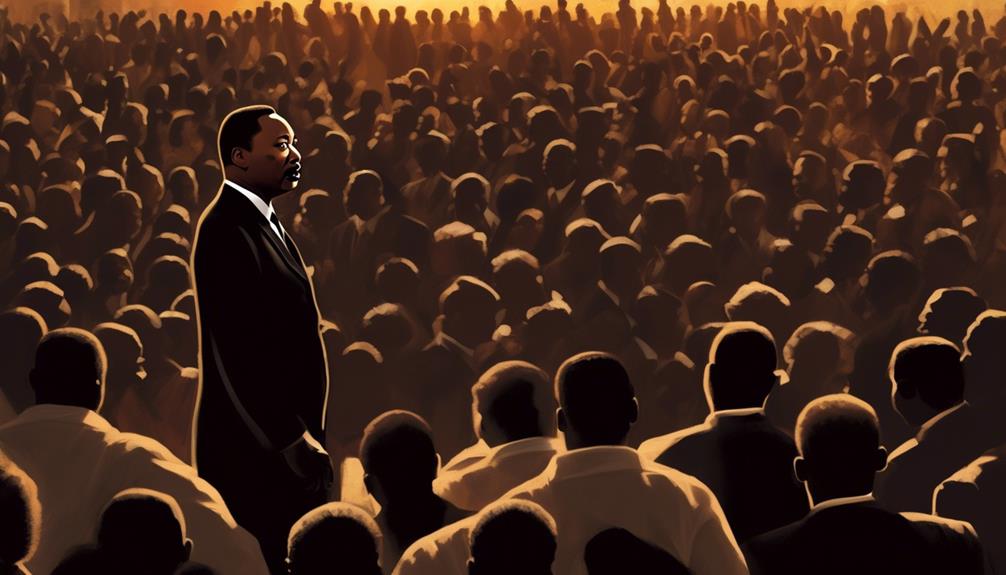
When it comes to facing disappointment, Martin Luther King, Jr. encourages us to accept the finite nature of setbacks and failures. However, he also reminds us to never lose sight of our infinite hope.
This quote serves as a reminder that while disappointments may be temporary and limited, our hope and determination should remain steadfast and unwavering.
Embracing Disappointment
In the face of disappointment, it's crucial that we acknowledge and accept the temporary setbacks we encounter, while holding onto the unwavering belief in the power of hope to transcend them. Embracing setbacks and finding strength in difficult times is a fundamental aspect of personal growth and resilience.
Here are four reasons why embracing disappointment can be a transformative experience:
- Growth through adversity: Facing disappointment allows us to learn from our mistakes and grow stronger as individuals.
- Building resilience: Embracing setbacks helps us develop the ability to bounce back from challenges and persevere in the face of adversity.
- Finding hidden opportunities: Disappointment often opens doors to new possibilities and unexpected opportunities.
- Deepening empathy: Experiencing disappointment can foster empathy, allowing us to better understand and connect with others who are facing similar struggles.
Cultivating Eternal Hope
How can we cultivate eternal hope in the face of finite disappointment? This question lies at the heart of Martin Luther King Jr.'s message of resilience and strength.
King understood that disappointment and setbacks are an inevitable part of the human experience, but he also believed in the power of hope to transcend these challenges. Cultivating eternal hope requires a steadfast belief in the possibility of a better future, even in the face of adversity.
It means finding strength in the face of disappointment and continuing to fight for justice and equality. King's teachings remind us that hope isn't passive; it requires action and determination.
True Peace Is Not Merely the Absence of Tension; It Is the Presence of Justice
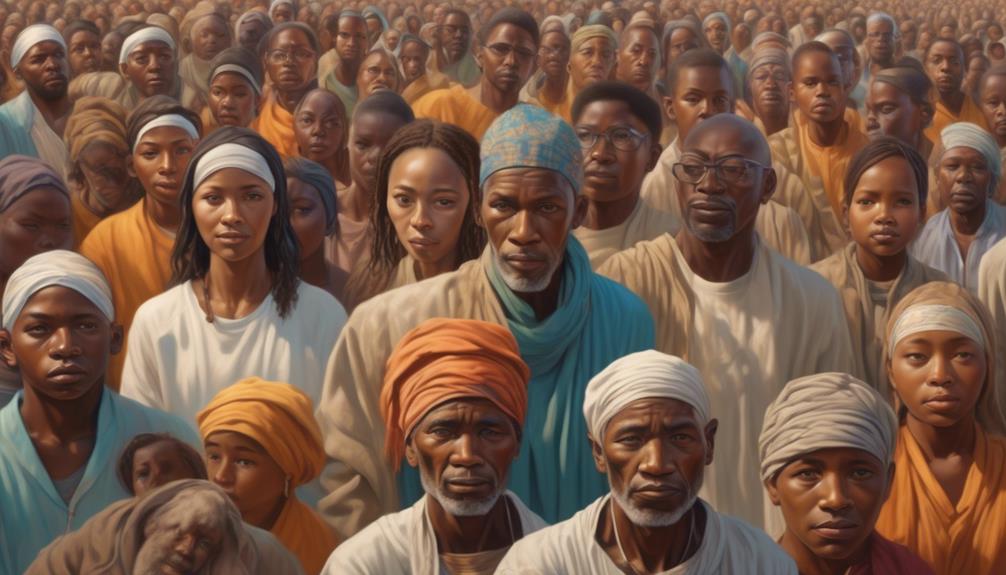
True peace, as Martin Luther King, Jr. emphasized, isn't simply the absence of tension, but rather the presence of justice. It's a state where every individual is treated fairly, where equality prevails, and where the rights of all are protected. When justice is established, it brings about a profound transformation in society.
Here are four reasons why the power of justice is essential for true peace:
- Empowerment: Justice empowers individuals and communities by giving them a voice and the opportunity to be heard. It allows marginalized groups to stand up against oppression and discrimination, leading to a more balanced and inclusive society.
- Healing: In the face of injustice, silence can be deafening. By breaking the silence and addressing the root causes of inequality, justice acts as a healing force. It provides closure for victims and paves the way for reconciliation, fostering unity and understanding among all.
- Social progress: Justice drives social progress by challenging systemic injustices and dismantling discriminatory practices. It ensures that everyone has equal access to education, employment, and other opportunities, creating a society that thrives on fairness and equality.
- Sustainable peace: When justice is present, peace becomes sustainable. By addressing the underlying issues that fuel conflict and inequality, justice builds a foundation for lasting peace. It promotes trust, cooperation, and harmony among diverse communities, paving the way for a better future for all.
Let No Man Pull You so Low as to Hate Him

'Let No Man Pull You so Low as to Hate Him' emphasizes the importance of rising above hatred and not allowing oneself to be dragged down by the actions or words of others. Martin Luther King, Jr. recognized the power of forgiveness and the dangers of hatred. Forgiveness has the ability to heal wounds, restore relationships, and bring about lasting peace. When we hold onto hatred, it consumes us, clouds our judgment, and prevents us from finding common ground with others.
In order to fully grasp the significance of rising above hatred, let us consider the following table:
| Power of Forgiveness | Dangers of Hatred | Importance of Rising Above |
|---|---|---|
| Heals wounds and promotes reconciliation | Consumes individuals and prevents personal growth | Allows for empathy and understanding |
| Restores relationships and fosters unity | Clouds judgment and impedes progress | Promotes peace and harmony |
| Encourages personal growth and development | Breeds animosity and perpetuates cycles of violence | Inspires others to follow a path of love and compassion |
The Time Is Always Right to Do What Is Right
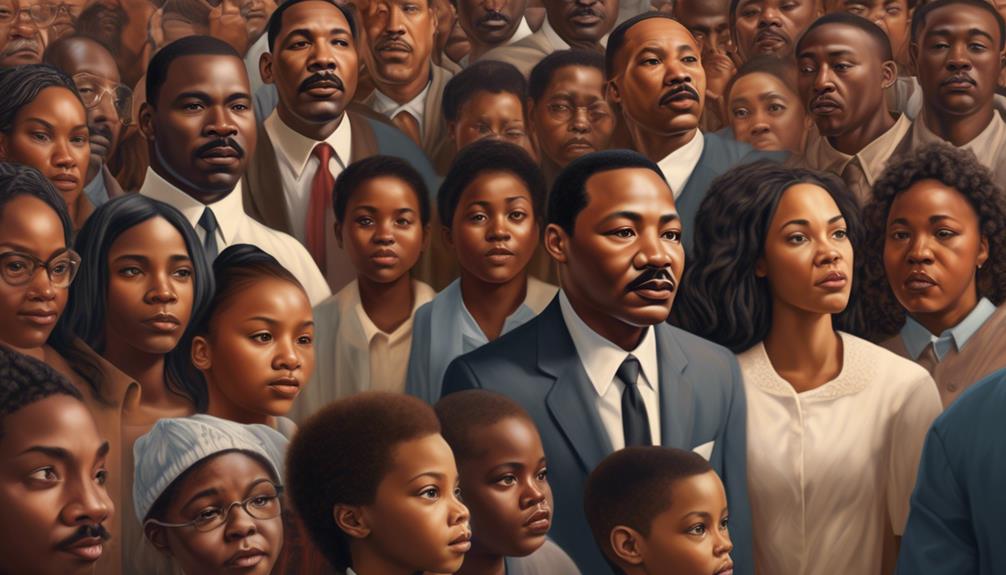
The Time Is Always Right to Do What Is Right emphasizes the importance of taking action and making ethical choices, regardless of the circumstances or external pressures. This quote by Martin Luther King, Jr. serves as a reminder of the power of action and the importance of integrity in our lives.
Here are four reasons why this quote resonates with us:
- Personal growth: By doing what's right, we challenge ourselves to grow and become better individuals. It takes courage and strength to stand up for what we believe in, even when it's difficult.
- Positive impact: Our actions have the power to make a difference in the world. When we choose to do what's right, we contribute to creating a more just and equitable society for all.
- Inspiration for others: When we lead by example and do what's right, we inspire others to do the same. Our actions can spark a chain reaction of positive change.
- Building trust and credibility: Acting with integrity builds trust and credibility both within ourselves and in our relationships with others. It establishes a solid foundation for meaningful connections and collaborations.
Frequently Asked Questions
What Is the Main Theme of Martin Luther King Jr.'S Famous Speech "I Have a Dream"?
The main theme of Martin Luther King Jr.'s famous speech 'I Have a Dream' is the pursuit of equality and justice for all, regardless of race.
This speech, delivered during the height of the Civil Rights Movement, holds immense significance as it resonated with people across the nation and continues to inspire generations.
Through his powerful words, King emphasized the need for racial harmony, unity, and the dream of a future where everyone is treated with dignity and respect.
How Does Martin Luther King Jr. Define Justice in His Quote "Injustice Anywhere Is a Threat to Justice Everywhere"?
In Martin Luther King Jr.'s famous quote, 'Injustice anywhere is a threat to justice everywhere,' he defines justice as a universal concept that can't be confined to specific locations or situations.
This quote highlights the power of action and the importance of addressing injustice wherever it exists. By emphasizing the interconnectedness of justice, King emphasizes the need for collective efforts to combat injustice.
He believed in the transformative power of unarmed truth and love as the driving forces for achieving justice.
What Does Martin Luther King Jr. Mean When He Says "Our Lives Begin to End the Day We Become Silent About Things That Matter"?
When Martin Luther King Jr. says, 'our lives begin to end the day we become silent about things that matter,' he's emphasizing the importance of speaking out against injustice and standing up for what's right.
This quote highlights the significance of actively engaging in the world around us and using our voices to create positive change.
How Does Martin Luther King Jr. Encourage Individuals to Take Action in His Quote "The Time Is Always Right to Do What Is Right"?
In Martin Luther King Jr.'s quote, 'the time is always right to do what's right,' he encourages individuals to take action. He emphasizes the importance of doing what's right, regardless of the circumstances or timing.
This quote inspires us to stand up for justice and equality, and to never remain silent about the things that matter. By urging us to act in accordance with our principles, King empowers us to make a positive impact on our communities and society as a whole.
What Does Martin Luther King Jr. Believe Will Ultimately Prevail in the World, According to His Quote "I Believe That Unarmed Truth and Unconditional Love Will Have the Final Word"?
Unarmed truth and unconditional love are believed by Martin Luther King Jr. to ultimately prevail in the world. This is evident in his quote, 'I believe that unarmed truth and unconditional love will have the final word.'
This quote reflects the theme of his famous 'I Have a Dream' speech, emphasizing justice and equality for all. King believed in the importance of speaking out and encouraging action, using peaceful means to achieve social change.
His words continue to inspire and guide movements for justice and equality today.
What Influence Did Desmond Tutu Have on the Civil Rights Movement Compared to Martin Luther King, Jr.?
Desmond Tutu, a prominent African religious leader, made a significant impact on the civil rights movement. His powerful quotes and unwavering commitment to social justice inspired many. While Martin Luther King, Jr. was a towering figure in the movement, Tutu’s influence, especially in South Africa, cannot be overlooked.
Conclusion
In conclusion, Martin Luther King, Jr.'s powerful quotes continue to inspire and resonate with people today. His words remind us of the importance of standing up against injustice and the need to fight for equality and justice.
Like a guiding light in a dark room, King's messages illuminate our path towards a better future. Let's remember his wisdom and strive to make his dream of a just and inclusive society a reality.
Joy, as our Editor in Chief, ensures the highest standard of content. Her talent in writing is complemented by her attention to detail and passion for literature and culture. Joy’s expertise and love for the English language shine through in her editorial work, making each piece a testament to quality and clarity.
